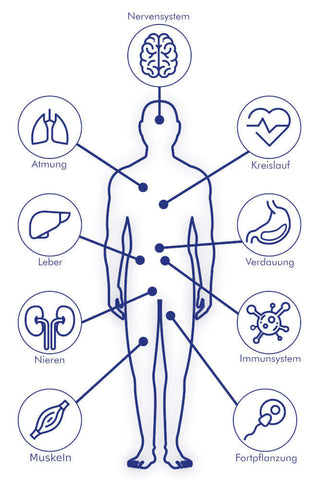Biomedical research areas

Biow has a biomedical department headed by Dr. Enrique Caso, which incorporates scientific knowledge into Biow's work through the Phoenix research project.
Thus, Biow meets the highest standards of quality and safety. Likewise, Biow's effectiveness in eliminating nanoparticles, viruses, fungi and bacteria is confirmed and certified by the most recognized European health institutions and laboratories.



Biow affects the human exposome
The exposome is the set of exposures related to our environment, lifestyle, and biological response that influence our health and disease throughout our lives. Dr. Caso explains:
"Biow positively modifies each person's internal exposome and eliminates cellular and extracellular nanotoxicity."
How do environmental nanoparticles affect us?

The respiratory system, especially the lungs, are often unable to filter nanoparticles such as particulate matter because these tiny particles are individually so tiny that they pass through all of the body's filters. Thus, they enter directly into the bloodstream, where they are transported to organs and cells and deposited there. This can lead to a deterioration in the performance of the organism with serious consequences for health. For detailed information on the subject of air quality, we recommend our postin the Air Quality Guide
Biow, thanks to its patented filtering technology WSN10, is able to filter these harmful nanoparticles and keep them away from the organism. Our body is thus able to spend more energy on cell regeneration and focus on other essential functions such as maintaining the body's defenses.
The CROS research group
. The CROS ("Cellular Response to Oxidative Stress") Research Group, led by Dr. Ana Coto Montes, is currently collaborating with Biow. They are investigating how exactly Biow can reduce oxidative stress and organic inflammation at the cellular and systemic level. Also in focus is Biow's potential to increase mitochondrial energy production and regenerate ATP. Preliminary evidence suggests that energy production in our cells increases when we regularly spend extended periods of time in a Biow environment, for example during sleep or work.
The CROS ("Cellular Response to Oxidative Stress") Research Group, led by Dr. Ana Coto Montes, is currently collaborating with Biow. They are investigating how exactly Biow can reduce oxidative stress and organic inflammation at the cellular and systemic level. Also in focus is Biow's potential to increase mitochondrial energy production and regenerate ATP. Preliminary evidence suggests that energy production in our cells increases when we regularly spend extended periods of time in a Biow environment, for example during sleep or work.










